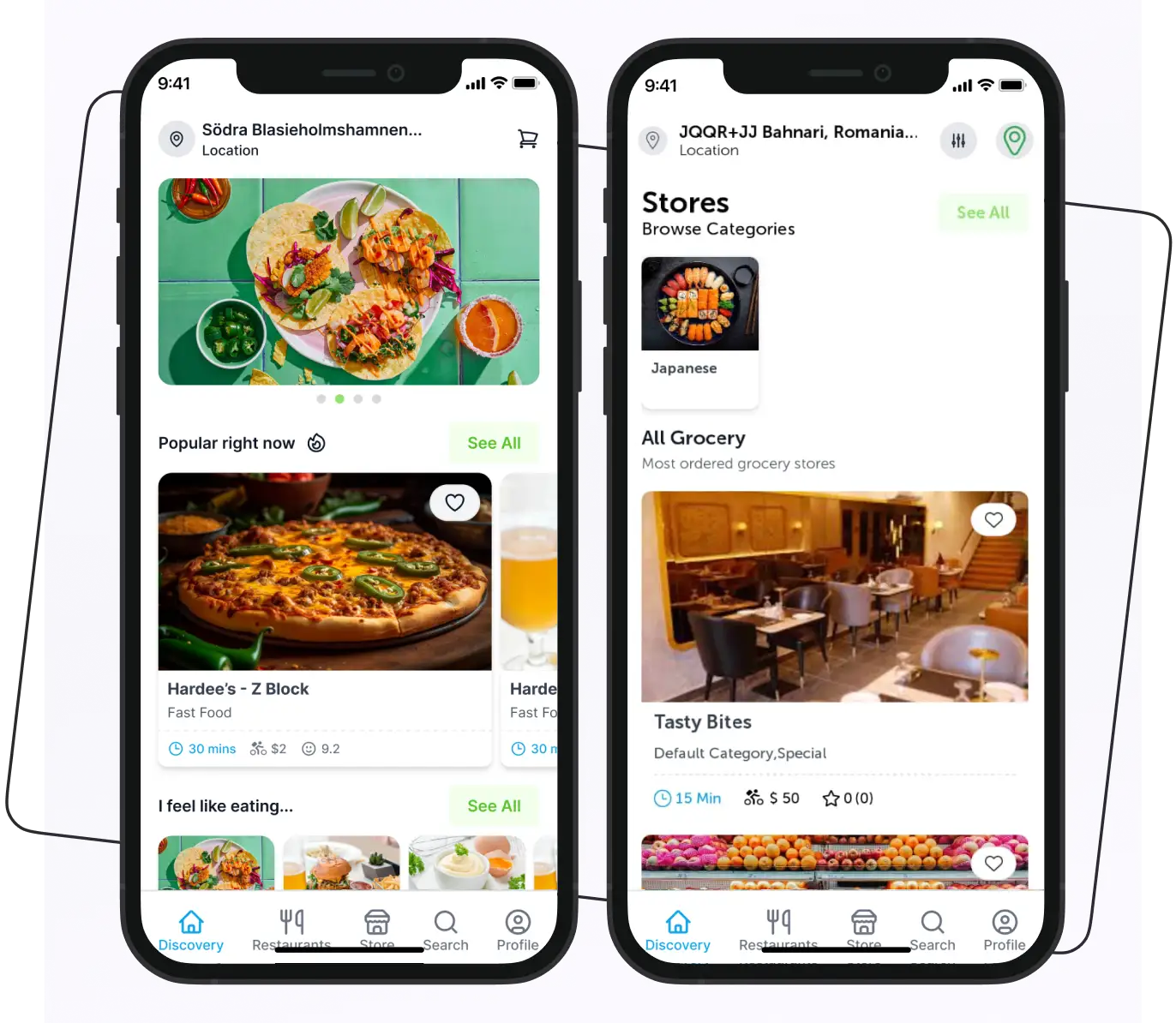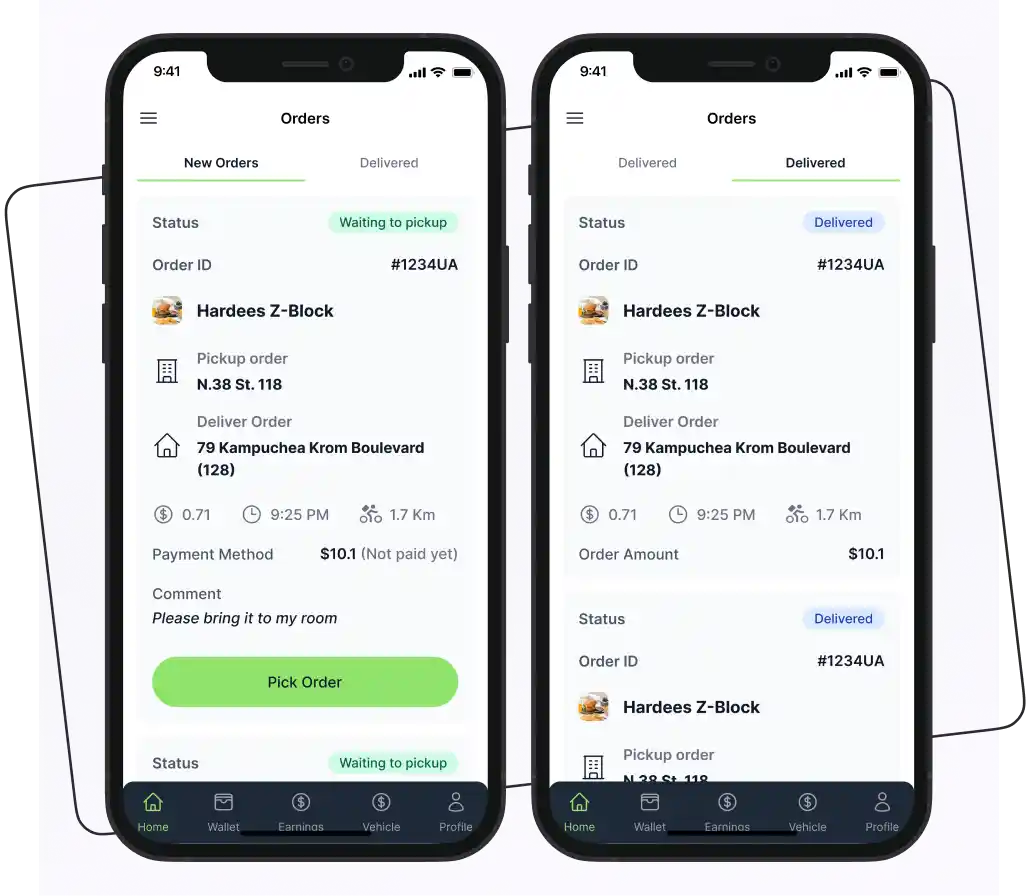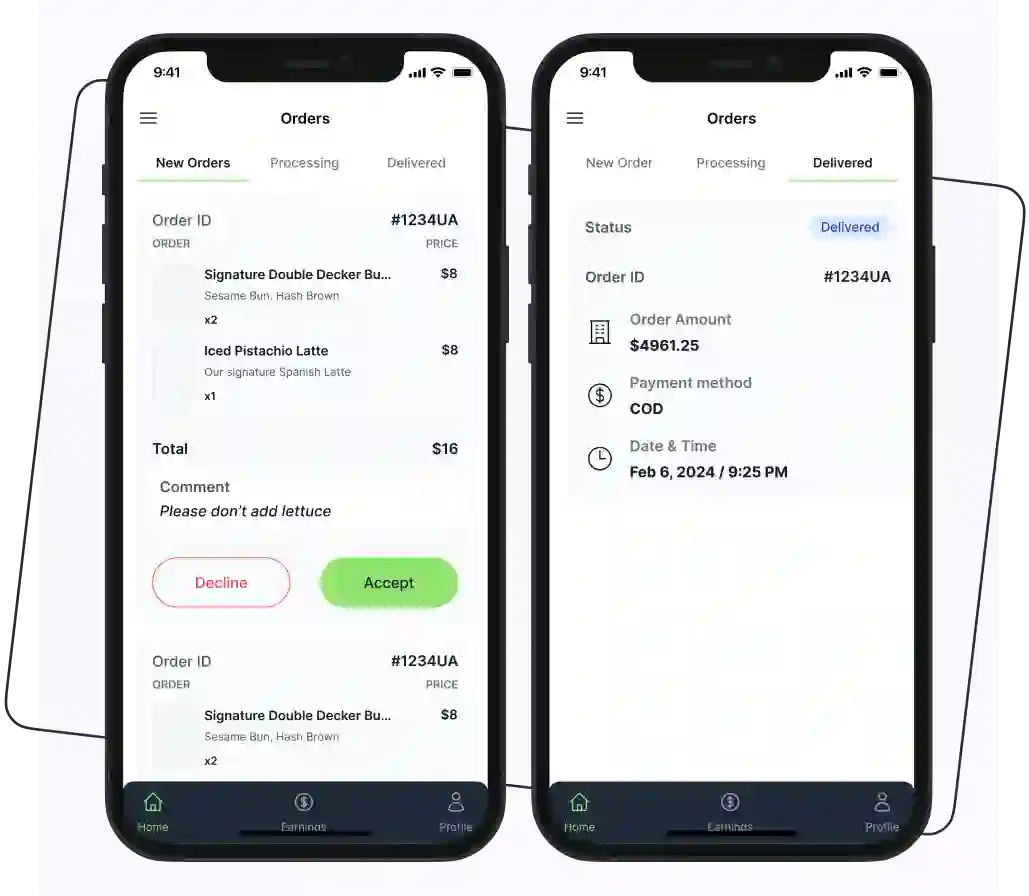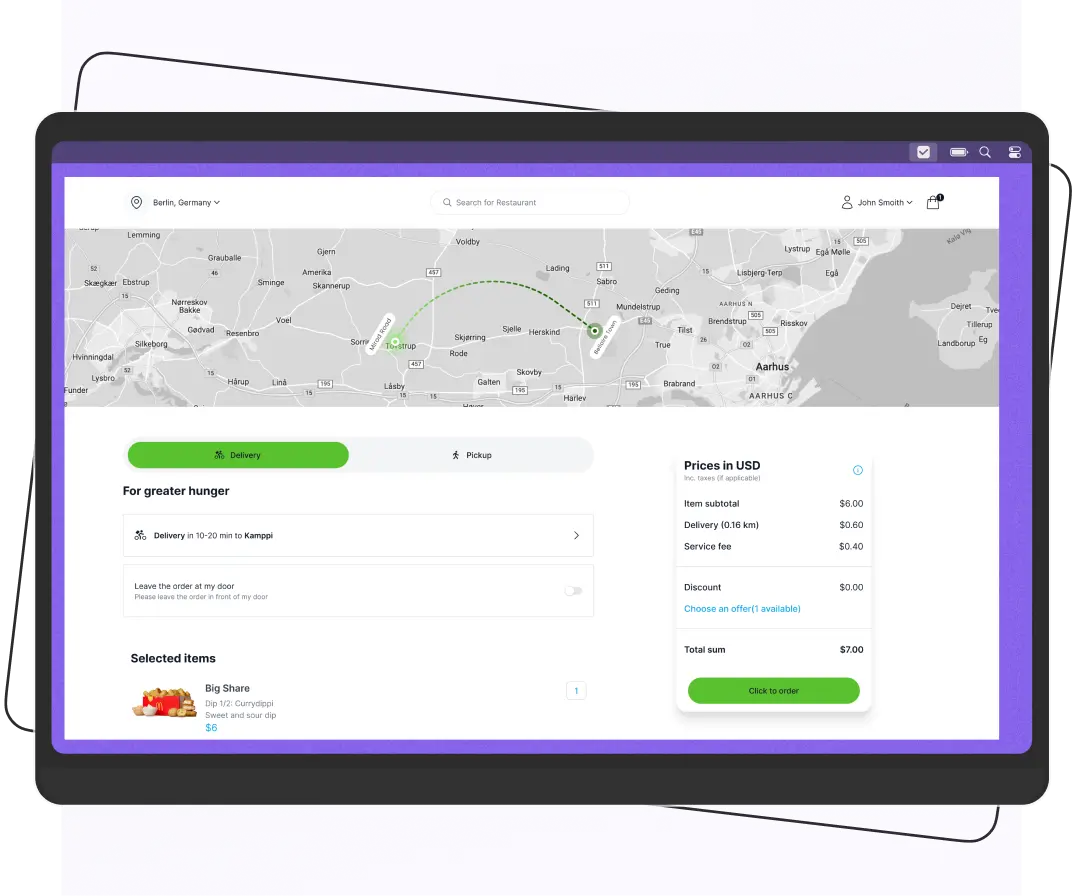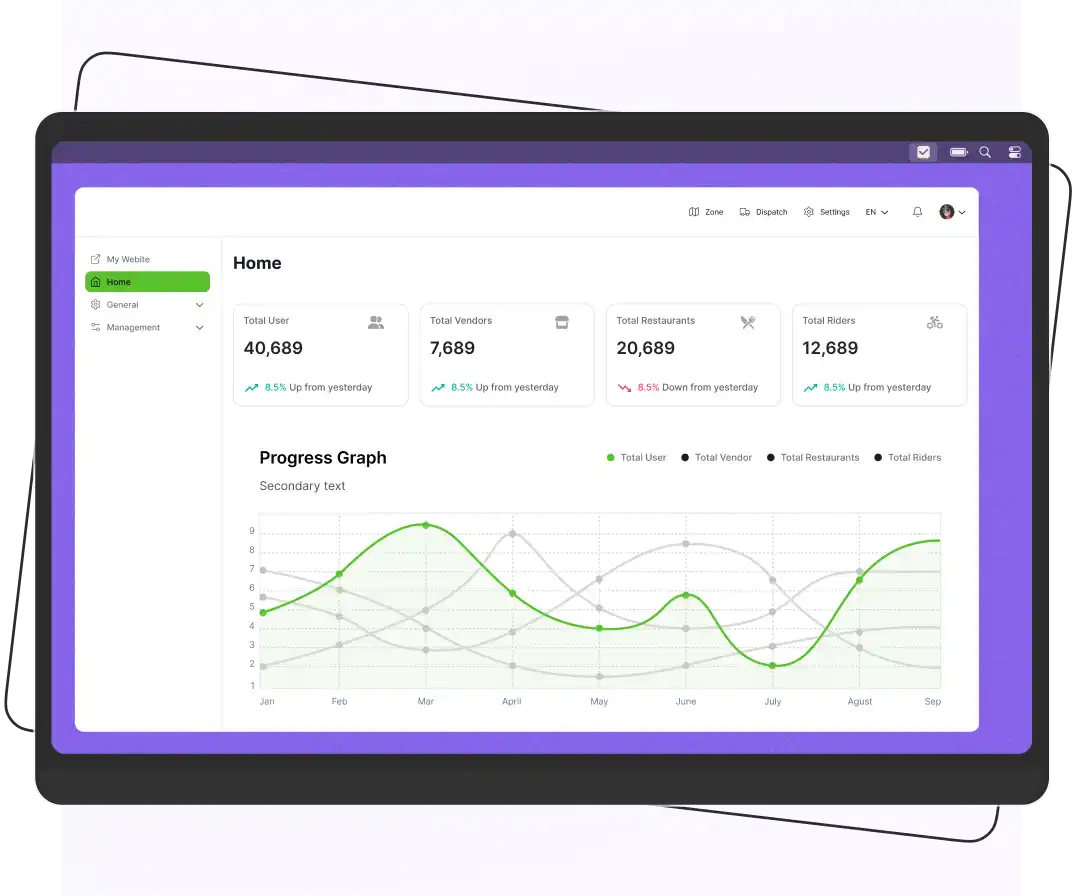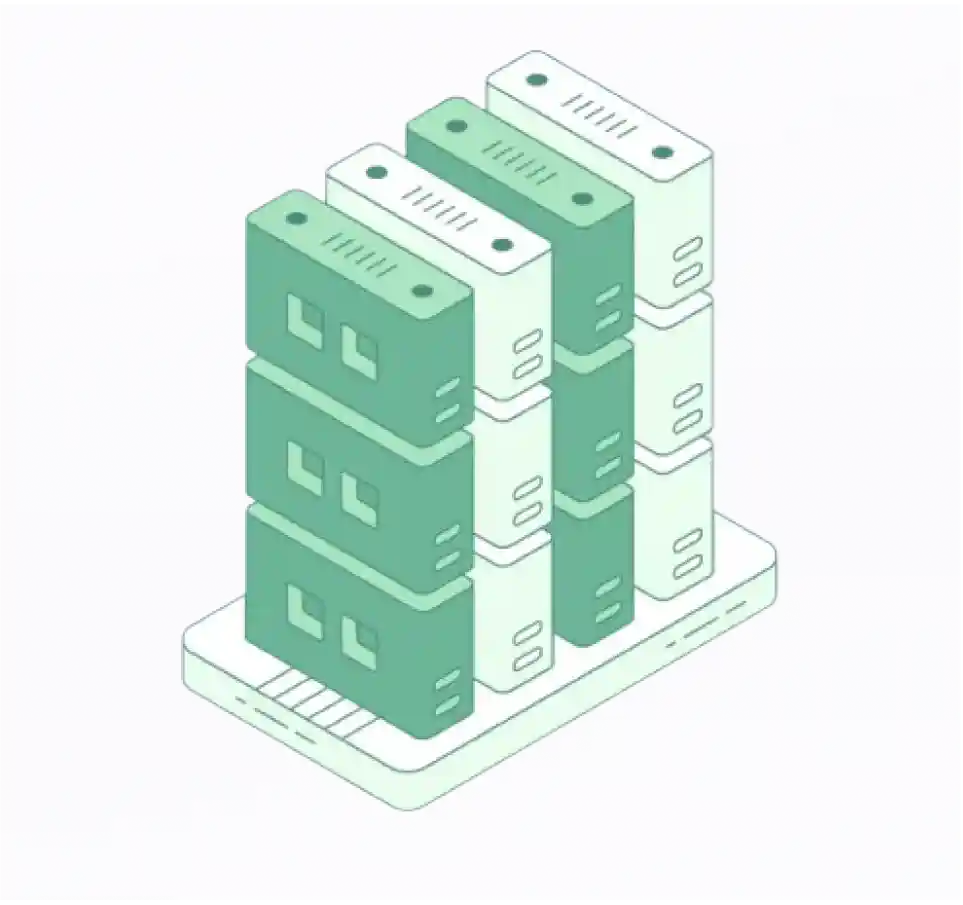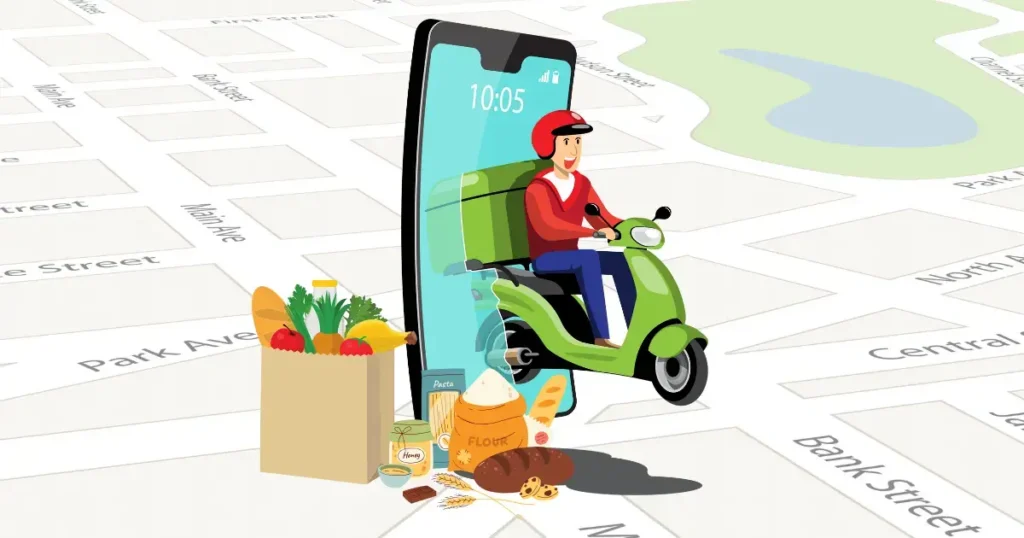
Now, you can build your app like Akelni within 2 weeks which helps you take your business to new heights and get more revenue. An Akelni clone app enables food delivery businesses to start taking orders online and streamline their entire business operations.
Akelni is a popular online food ordering and delivery service that operates in 11 cities in Egypt. An estimated $1 million is made annually by the Akelni. More than $1.2 million has been raised to help it compete with major companies including Talabat, Mrsool, Elmenus, Just Eat, and McDelivery.
The global food ordering and delivery market is estimated to be worth $1 trillion, and it is expected to continue growing in the years to come. Therefore, if you are running a food business, creating an Akelni clone app helps you succeed in the competitive market.
If you need to know how to create a successful app like Akelni and increase the sales of your business, what benefits it offers, how much it costs to build it, and more, then you’re at the right place. Here we will cover everything about creating a great app for your food delivery business.
So, let’s start.
What is Akelni Clone?
An Akelni clone app is a replica of the Akelni food delivery platform with some advanced features. It is a software application or platform that is designed to mimic the key features and functionalities of the original app.
The main purpose of an Akelni clone is to provide a ready-made solution for businesses or entrepreneurs who want to launch their food delivery service, without having to build the entire platform from scratch. These clones are often customizable and can be white-labeled to match the branding and requirements of the business.
With the help of the Akelni app clone, you can conduct business tasks online and grow in the market of the food industry.
How Does an Akelni Clone App Work?
Before creating an app like Akelni, you should know how it works. Therefore, when you create an app you will face no issues and build it without hassle.
Here is the workflow of the Akelni clone app for your better understanding.
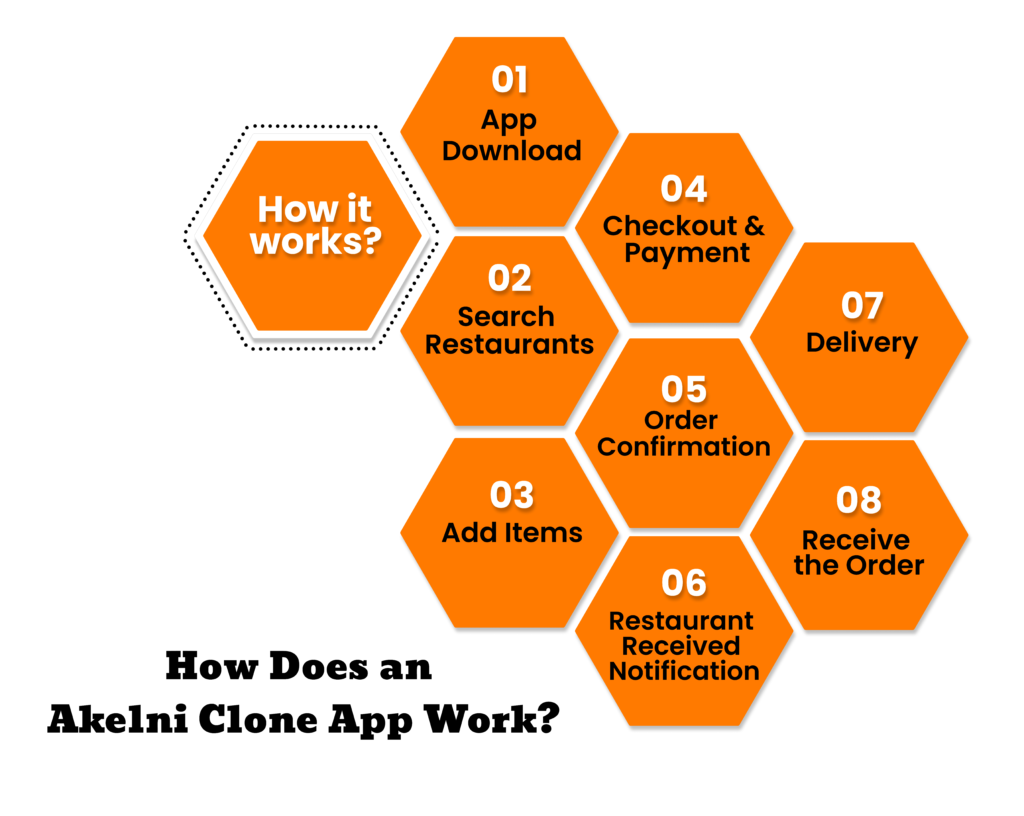
1. App Download
Customers download the app on their mobile phones.
2. Search Restaurants
Customers search restaurants by cuisine, prices, location, and ratings to make an informed decision.
3. Add Items
After selecting the restaurant and food items, add them to the cart and proceed to the next step.
4. Checkout and Payment
In this step, users can proceed to the checkout process. Users can review their order, provide any additional instructions if needed, and choose a payment method. The Akelni app clone offers a variety of payment options, including credit/debit cards, digital wallets, and cash on delivery.
5. Order Confirmation
When the order is placed, users receive the notification that their order is confirmed with estimated delivery time.
6. Restaurant Received Notification
Restaurants receive the notification and start preparing the food. Also, they have the option to accept or reject the order request according to their availability. Once the order is ready, the restaurant assigns the order to the nearest rider.
7. Delivery
The assigned rider receives a notification from the restaurant with complete user details. In addition, the rider has the option to accept or reject orders.
8. Receive the Order
Users can receive the order from the rider and provide feedback according to their experience related to food quality and delivery service.
Supercharge your deliveries with Enatega.
Schedule a Call NowBenefits of the Akelni Clone App for Customers and Restaurants
The Akelni clone app is an on-demand food delivery platform that provides several benefits to customers and businesses and makes their entire food delivery process seamless.
Let’s explore the benefits.
| Restaurants | Customers |
| Quick Launch: Building the white-label Akelni clone app solution can help reduce development time and expenses. It enables food delivery businesses to focus on their core operations and launch the app quickly in no time. | Order Tracking: Customers can track their orders in real-time from food preparation to delivery. It helps to build trust and transparency between the customer, restaurant, and rider. |
| Cost-Efficient: It is a cost-effective solution as compared to building the app from scratch. Therefore, without wasting a lot of money and time, customize the app according to your business needs. | Get Food from Various Restaurants: On the food clone app, customers can get food from various restaurants without juggling different apps. With just a few taps on the phone, they get their favorite cuisine to their doorstep. |
| Scalable: The food clone apps are scalable and help to grow in the food delivery industry. The on-demand Akelni clone app solution handles the increased workload without compromising the app’s performance. | Order Customization: It is one of the main benefits of a food delivery app like Akelni. Customers can customize their orders according to their preferences. Also, they can give special instructions to restaurants like which items to add or exclude from the food you order. |
| Manage Operations: The food clone app streamlines various aspects of your food delivery business operations. Also, it reduces the chances of errors and improves customer satisfaction. | Save Money: Customers can save money by using discounts and deals available on the food app. Food delivery apps often run special promotions during holidays or seasons when demand is higher, providing opportunities for greater savings. |
| Expand Customer Base: The open source Akelni clone app benefits restaurants by accessing a large number of customers. | Multiple Payment Options: Customers can benefit from having access to multiple payment options when using an Akelni food clone app. Multiple payment choices make it easier for customers to track and manage their spending across various accounts or cards. |
Features of the Akelni Clone App
The Akelni app clone contains the customer app, restaurant app, rider app, and an admin dashboard. Each app has a basic set of features that help the app to stand out in the crowded market.
Let us check below the essential features of each app.
User App
| Features | Description |
| Social Media Sign-Up | Allowing users to easily register by syncing their social media accounts is a common and convenient feature for food ordering apps. This helps streamline the sign-up process. |
| Order Tracking | On the food ordering platform, users can track their orders in real-time and get updates till they receive their orders. |
| Advanced Search and Filter | Users can search for their favorite cuisine based on various factors such as delivery fees, ratings, location, cuisine, name of the restaurant, and minimum order value. |
| Order Cancellation | Using this feature, customers can cancel their order at any time before the restaurant begins preparing the order. When a customer cancels their order, they will issue a refund to them via their payment method. |
| Group Ordering | This feature allows multiple people to add their items to a cart, at the same time. |
| Order Scheduling | Customers who prefer to receive their food orders when they are at home can schedule their pick up ahead of time to avoid any inconvenience. |
| Ratings and Reviews | The Akelni app clone allows users to rate and review the service based on their experience. |
Restaurant App
| Features | Description |
| Profile Update | Restaurants can update their profile information on the food ordering platform. This allows them to provide the most up-to-date details about their establishment to customers. Some key things restaurants can update in their profile include: Operating hours Menu items and pricing Cuisine type Photos of the restaurant and food Contact information and location details |
| Availability Status | It is the most important feature of the restaurant app. Restaurant owners can change their availability status online/offline. |
| Sales Report Analysis | The restaurants can check their sales performance report which helps them to make an informed decision about their business. This report is an invaluable tool for any restaurant and helps them to focus on continuous improvement and long-term success. |
| Product Management | From the app, restaurants can manage products and improve the productivity of their business. |
Rider App
| Features | Description |
| Instant Notifications | When the restaurant assigns the order to the delivery rider, they will get a notification on their mobile phone. |
| Route Optimization | Using this feature, the rider can deliver the order to the customer’s location promptly using the shortest and fastest route. |
| Order Accept/Reject | The rider’s decision to accept or reject an order is based on their current availability and capacity to take on that order. For example, if a rider is already busy with another order, they may choose to reject a new order that comes in. Or if a rider has time and capacity available, they may choose to accept a new order. |
| Monthly Earning Report | On the rider delivery app, riders can check their monthly earnings and keep track of them without hassle. |
Admin Dashboard
| Features | Description |
| Manage Restaurants | From the admin dashboard, manage various restaurants. Get insights about online food orders and manage deliveries easily. |
| Revenue Management | Maximize your restaurant’s success with a revenue management feature. It helps you to dynamically adjust menu prices based on factors like demand, day of the week, time of day, etc. This helps you charge more during peak hours/days and offer discounts during slower periods. |
| Language Settings | Using this feature, change the language of the app to Arabic, Russian, and English that suit your needs. |
| Manage Customers and Riders | The dashboard is the central control interface that allows you to monitor and manage the customers and riders. |
Technology Stack for Building the Akelni Clone App
Selecting the perfect technology stack for your food delivery clone app is crucial for the performance and scalability of an app. The right stack is a critical step in developing a successful delivery app and depends on your app requirements and expertise.
Look at the below table and understand what tech stack you use in your customizable Akelni clone app.
| Component | Technology |
| Frontend | |
| User Interface | React.js, Vue.js, or Angular |
| Styling | CSS-in-JS |
| Routing | React Router, Vue Router, or Angular Router |
| Backend | |
| Web Framework | Node.js (Express.js), Ruby on Rails, or Django |
| Database | PostgreSQL, MongoDB, or MySQL |
| Authentication | Auth0, Firebase Authentication, or custom solution |
| Authorization | Role-based access control (RBAC) |
| Microservices | |
| Order Processing | Node.js, Go, or Java |
| Payment Processing | Stripe, Braintree, or PayPal |
| Delivery Tracking | Node.js, Go, or Java |
| Infrastructure | |
| Cloud Platform | AWS, Google Cloud, or Microsoft Azure |
| Containerization | Docker |
| Orchestration | Kubernetes |
| Other Components | |
| Messaging | RabbitMQ |
| Search | Elasticsearch or Algolia |
| Notifications | Firebase Cloud Messaging, or Twilio |
How to Build an App Like Akelni?
Below are some steps to help you build the ready-to-use Akelni clone app.
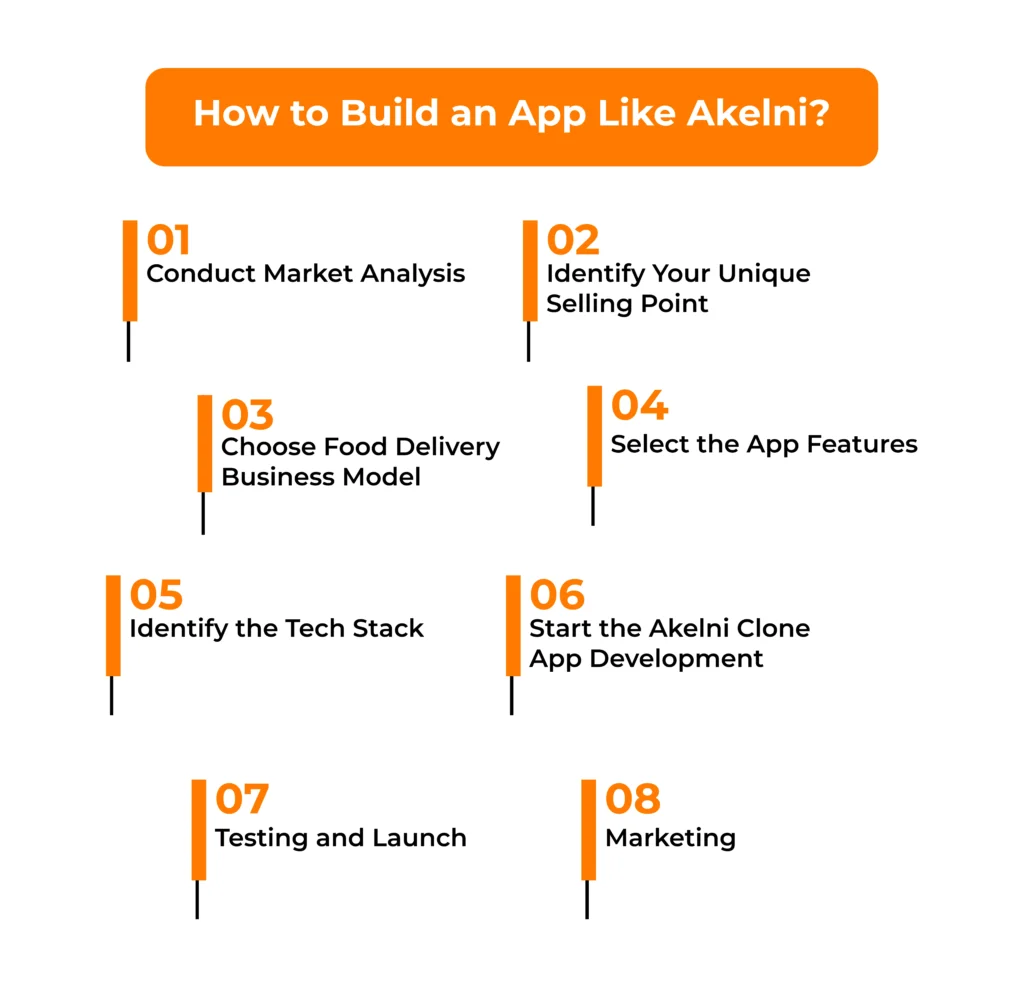
1. Conduct Market Analysis
Before developing the food app, do some market research. In this phase, you can do these things:
- Research the food delivery market
- Understand the pain points of customers
- Analyze the competition
- Identify the strengths and weaknesses of your competitor’s app
2. Identify Your Unique Selling Point
Based on the market analysis, determine what sets your food delivery clone app apart from the competition. This could be faster delivery, a wider range of cuisine options, better customer service, or unique features.
3. Choose a Food Delivery Business Model
Decide on the appropriate business model for your Akelni clone app, such as commission-based, subscription-based, or a hybrid model. Select the model that best meets your requirements.
4. Select the App Features
Identify the core features that your clone app should have, such as user registration, menu browsing, order placement, delivery tracking, and in-app payment. Always add unique features that set your app apart from competitors.
5. Identify the Tech Stack
Determine the technology stack you’ll use for your Akelni clone script app, including the programming languages, frameworks, and databases. Some popular options include:
Frontend: React.js, Angular, Vue.js
Backend: Node.js, Python (Django or Flask), Ruby on Rails
Database: MongoDB, MySQL, PostgreSQL
Mobile app: React Native, Flutter, or native iOS and Android development
6. Start the Akelni Clone App Development
Begin the development process and divide this step into various phases.
- Designing the user interface and user experience
- Developing the backend API and integrating it with the frontend
- Implementing the core features, such as user authentication, order management, and payment processing
- Integrating third-party services, such as mapping, delivery, and payment gateways
7. Testing and Launch
Thoroughly test your Akelni app clone to ensure it’s bug-free and meets the desired functionality. Once you’re satisfied, launch the app on the app stores (iOS and Android) and your website.
8. Marketing
Develop a strong marketing strategy to promote your Akelni app clone. The more you promote your app, the more users will use your app. You can use social media marketing, influencer partnerships, and targeted advertising to promote your app.
Cost of Building the Akelni Clone App
The cost of building the Akelni clone app may vary depending on factors such as project scope, team expertise, and the chosen technology stack.
The below table shows a rough estimate for your better understanding of building the customizable Akelni clone app solution.
| Cost Category | Estimated Cost |
| UI/UX Design | $15,000 – $25,000 |
| Frontend Development (React/Flutter) | $25,000 – $40,000 |
| Backend Development (Node.js/Python) | $20,000 – $35,000 |
| Database Setup (MongoDB/PostgreSQL) | $5,000 – $10,000 |
| Authentication and Authorization | $8,000 – $12,000 |
| Payment Gateway Integration | $7,000 – $12,000 |
| Push Notifications | $5,000 – $8,000 |
| Testing and QA | $8,000 – $12,000 |
| Deployment and Hosting | $3,000 – $5,000 |
| Maintenance and Support (1 year) | $5,000 – $10,000 |
| Total Estimated Cost | $101,000 – $169,000 |
How Long Does It Take to Clone an App Like Akelni?
The time it takes to clone an app like Akelni depends on several factors, such as:
- App’s complexity
- Features you want to include
- The development team’s expertise and more
Look at the below table and understand the estimated timeline for building an app like Akelni.
| Phase | Tasks Involved | Time Required |
| Planning and Research | Market research Define features and functionality Create a project roadmap | 1–2 weeks |
| UI/UX Design | Design wireframes and prototypes Finalize layout and visuals Ensure usability | 1–3 weeks |
| Development | Frontend Development Develop user interface Backend Development Set up server, database, and APIs Integration Payment gateways, real-time tracking, notifications Unit, integration, and performance testing | 4–8 weeks |
| Quality Assurance (QA) | Identify and fix bugs Conduct beta testing to gather feedback | 1–2 weeks |
| Deployment and Launch | Deploy to app stores Set up backend hosting | 1 week |
| Total Estimated Time: 6-12 weeks | ||
Supercharge your deliveries with Enatega.
Schedule a Call NowConclusion
The Akelni clone app is a platform that helps you to succeed in the food delivery business. It provides the chance to boost your business online at an affordable cost.
So, are you ready to launch your white-labeled food delivery businesses like Akelni? Book a free demo with Enatega and dominate the food delivery market in your region. Our experts help to grow your business online with food clone apps. Whether you need a Foodpanda clone, DoorDash clone, or any other delivery app, we’re here to build it for you.













 IOS
IOS Android
Android Web
Web